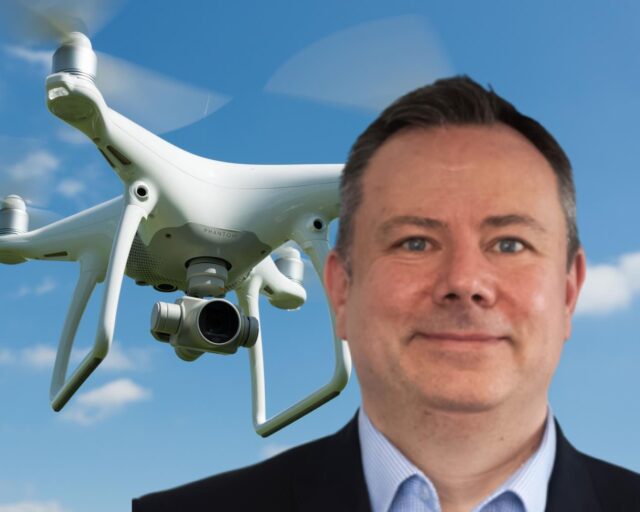An insurance broker, which insures the largest single fleet of drones in the UK, is warning professionals who use drones within their business, that their innovative approach to service delivery could be altering their liability and cyber risks.
Ascend Broking, whose head office is in Chelmsford, says that unwittingly, at times, farmers, estate agents, contractors, surveyors, roofers, manufacturers, photographers and video production companies, amongst others, could become public enemy one, if something goes wrong with their drone flight, or a cyber hack occurs utilising their drone’s connectivity.
The capacity for a drone – sometimes known as a UAS (unmanned aircraft system) or UAV (unmanned aerial vehicle) to cause damage to property or people is reasonably high. A pilot could lose control of their remotely piloted system, or have a technical failure when flying close to homes or members of the public.
Another possibility is a bird strike, with the drone hitting a flock in flight and crashing to the ground or into a structure or person. Bird strikes are the fifth largest generator of aviation insurance claims.
Depending what the drone hits and what substances may be contained, the impacts could be significant, with the potential for a fire or oil spillage, and resulting environmental damage, to occur.
Damage to the drone itself and any equipment slung beneath, such as cameras, is also a real possibility.
What many drone-operating businesses may not consider, is that their drone could potentially be hacked whilst flying over a business or private home. Hacking into a drone can be an attractive option for a criminal. Obtaining images of the layout of a high net worth property, for instance, could be hugely helpful to a burglary gang.
Drones can be hacked in a similar way to a computer and by people up to a mile away from where the drone is flying, with the hack occurring through the interception of the signal. If a criminal can block the signal and connect it to their device, they can manipulate it. Some criminals can engage in GPS spoofing, making the operator believe it is flying as they wish it to, but actually deliberately crashing it or flying it to a location where they can access its data.
Unfortunately, a hacked drone can be a route into a wireless network, enabling a criminal to steal data. It is essential that an operator is aware of the risks and does all they can to prevent their drone becoming hackable. Using anti-virus software and a VPN (virtual private network) is just as important for a drone as for a computer.
With all of these considerations, it is imperative that professionals, who have transformed their service by introducing drones, do not assume their existing insurance cover is sufficient.
“We would urge anyone using a drone within their business to pick up the phone and talk to us about their existing insurance policies, so we can check whether cover is sufficient,” says Ascend Broking’s managing director, Matt Collins.
“Their public liability insurance limit may need to be increased; in fact, some businesses not ordinarily dealing with the public, may not even have public liability insurance.
“Specialist drone cover is also available, to protect the equipment, from risks such as crashes, weather impacts, harm and theft. If we then consider the cyber risks and the penalties levied by GDPR legislation, it is essential that drone operators also have a cyber insurance policy in place.
“The good news is that we can talk a business through all of this and help them understand their own individual exposures. We don’t wish to drone on about insurance, but we would ask permission to do so. It is vital, if drone-operating businesses want to avoid losses through big liability and cyber claims.”




